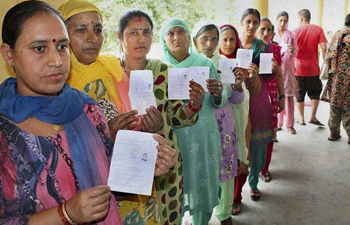
Shimla, Jun 30: Chief minister Virbhadra Singh's wife Pratibha Singh of Congress has won Mandi parliamentary byelection by 1.37 lakh votes. She defeated BJP candidate and four time MLA Jai Ram Thakur. This is the second time when Pratibha Singh has won from Mandi seat.
Polling for byelection was held in two phases. While in the first phase polling was conducted on June 23, in Kinnaur district where all roads were blocked polling was held on June 27. With landslide victory for Congress, chief minister Virbhadra Singh has once again proved his mass base and grip over state politics.
For the byelection Virbhadra Singh was single handedly campaigning for Congress candidate and for a month he remained out of state capital Shimla to tour all the 17 assembly segments of this constituency. Virbhadra even remained stranded in Kinnaur for around three days after rain and flood cut off the road link to Sangla valley and he was later airlifted.
This time low turnout of voters had led to the speculation that winning margin might remain low but Pratibha Singh managed to get the lead of over a lakh vote this time too. In 2004, Pratibha Singh had won from Mandi but she had not contested the 2009 election instead her husband Virbhadra Singh contested from Mandi and won the election.
While in 16 assembly segments of Mandi parliamentary seat voter's turnout was 53 per cent, in rain ravaged Kinnaur district 54 per cent polling was recorded.
Himachal Pradesh chief minister Virbhadra Singh has thanked the Mandi parliamentary constituency voters for landslide victory of congress candidate Pratibha Singh and said that it is victory of ideology and leadership of Congress president Sonia Gandhi and Congress vice president Rahul Gandhi.
He said that the victory has showed that people have expressed their faith and confidence in the programmes and policies of the state government and said that this victory will further strengthen the resolve of the state government for ensuring the over all growth of the entire state.
Virbhadra has specially thanked the voters of the Kinnaur district who overwhelmingly voted for the congress candidate despite of the natural calamity in the region and assured them that government will reciprocate with same spirit for ensuring the speedy development works and undertaking massive relief ad rehabilitation works in the region to bring normalcy in the area.
Conducting election in Mandi parliamentary seat was a challenge for Election Commission this constituency has some of the toughest polling stations that could be reached only on foot. Mandi parliamentary constituency has world's highest polling station at Hikkim village of Lahaul-Spiti that is situated at a height of 15000 feet. It has also got the unique distinction of having first voter of independent India 96-year-old Shyam Saran Negi who despite his ailing health and cast his ballot in Kalpa polling station on June 27.





Comments
Add new comment